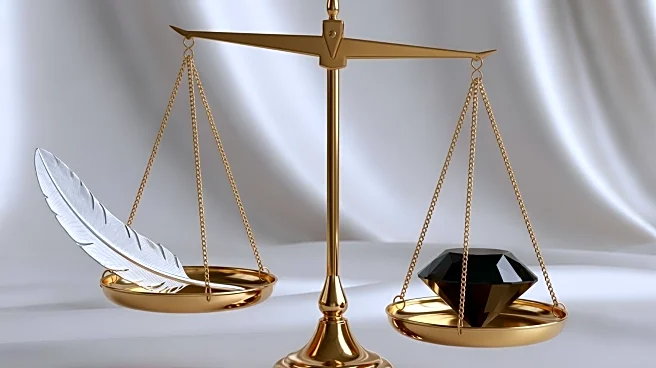What's Happening?
Gucci has achieved a legal victory in its trademark infringement case against Lord & Taylor Ecomm LLC, a digital entity of the former department store. A federal court in New York awarded Gucci $1.3 million
in damages and upheld a permanent injunction against Lord & Taylor for selling counterfeit Gucci products online. The court found Lord & Taylor in civil contempt for ignoring previous court orders but did not impose additional monetary penalties. The case began in November 2023 when Gucci alleged that Lord & Taylor was selling counterfeit items such as handbags, belts, and shoes. Despite initially participating, Lord & Taylor ceased involvement in the litigation, leading to a default judgment and a permanent injunction in August 2024. The court-appointed magistrate judge recommended damages based on the scale of infringement, which Judge Lorna G. Schofield confirmed, awarding Gucci statutory damages under the Lanham Act.
Why It's Important?
This judgment highlights the challenges luxury brands face in combating counterfeit sales in the digital marketplace. It underscores the willingness of U.S. courts to enforce trademark rights and issue significant financial penalties against entities that infringe upon them. The case serves as a warning to digital platforms and legacy brands that may attempt to exploit their names for selling counterfeit goods. For Gucci, the ruling reinforces its trademark protections and deters future infringements. The decision also reflects the broader legal landscape where courts are increasingly proactive in addressing intellectual property violations, especially in cases involving non-compliance with court orders.
What's Next?
While the court denied additional sanctions against Lord & Taylor due to lack of evidence and claimed financial distress, Gucci's victory may prompt other luxury brands to pursue similar legal actions against counterfeit sellers. The case could lead to increased scrutiny of digital platforms and their role in facilitating counterfeit sales. Brands may invest more in monitoring and enforcing their trademark rights online. Additionally, the ruling may influence future court decisions regarding trademark infringement and the enforcement of intellectual property rights in the digital age.
Beyond the Headlines
The case illustrates the evolving nature of retail, where traditional department stores like Lord & Taylor transition to digital platforms, sometimes with less transparency. This shift poses new challenges for intellectual property enforcement, as brands must navigate complex online environments to protect their trademarks. The ruling may encourage stricter regulations and oversight of e-commerce operations to prevent the sale of counterfeit goods. It also highlights the importance of maintaining brand integrity and consumer trust in the luxury market.









